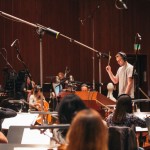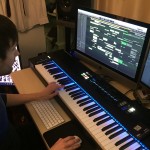I thought I told you that we won’t stop! We still have a couple interviews to churn out from GDC last month, and they’re actually somewhat related. This time we have Taku “TaQ” Sakakibara, who is known mostly for his extensive work on the Beatmania series. His work was ported over to Dance Dance Revolution, and his name should look very familiar to series fans with hits like “Electro Tuned,” “Era,” and my personal favorite, “Holic.”
It’s actually been a while since TaQ worked on a Bemani project, and we take this opportunity to talk about his time with the company, the retooling of his music for Dance Dance Revolution, how he came to work on a track for Granado Espada, and a 20-minute long symphony he wrote that debuted in the prestigious Carnegie Hall. While we realize TaQ isn’t a household name, we hope we can introduce you to him and his work!
Hit the jump for our talk with TaQ!
OSV: We’re here with TaQ. Most of us know you as a Bemani composer because you were associated with Beatmania and Dance Dance Revolution for so long. How long were you with Bemani, and when did you leave?
TaQ: I started from the “2nd Style.” I don’t think it’s very well known here, but it was the third version, and I worked up through the 10th version. Two versions came out per year, so it was about 5 years, and I wrote about 23 songs during that time.
There was actually a kind of battle between a very good friend of mine who was a producer for the game, DJ TAKA. We battled to see who was better at writing music for the game. Of course, the users always decided on the Internet, and wrote all sorts of things on the bulletin boards at the time. It was an interesting match, but we got very tired after that. I had a period over a year where I couldn’t match up with him because my interests went not directly straight into the game. It was kind of a slump, but in the 10th style, I had this track, “Innocent Walls.” It was for me quite comfortable, and I had a feeling that the users would like it, and the game itself, which I did the note programming myself, had a hook and was quite different and unique for that time. After that, I felt confident in saying, “Okay, I’ve done what I can for this game.” Not just writing music, but finding out ways to express playability which wasn’t there before. I created stop arrows, or isolating errors. I even made letters spelling “Konami” in Japanese letters using the arrows in the game. I was kind of joking around for years. That was some time ago.
OSV: How did you come to work in Bemani? You said you started with the 3rd mix, so that was near the beginning.
TaQ: So that’s actually an interesting story. DJ TAKA and I were good friends from junior high school. We were fourteen or something, and he was the star band vocalist for the school band, and I always wanted to join his band, and I practiced a lot of guitar playing and showed him, and he said it wasn’t his style and always rejected me. It wasn’t mean or anything, he just wasn’t interested in me at the time, we were just classmates. After graduating school, the first day we met after two years without seeing each other, we had spontaneously decided to write some music together. We were partners for years before he got into Konami, and I had applied there and got a freelance position in the music production house. It was a small department, with only three of us there, and I was the youngest one. I was basically washing dishes there and cleaning toilets, waiting for my chance. That chance came very quickly because that music production house got a job for writing music for Beatmania. And that was the song “Electro tuned,” and that was the first song I wrote for Beatmania. I was really lucky that the players of the game were really happy with the song, and that feedback gave Konami a good feeling about using my songs again, so it continued.
OSV: How did Konami collect user feedback? Were there polls, or was it all written on forums?
TaQ: Well, it was the same as it is now. There are people on the bulletin boards who write anything they want, even though they didn’t know us. You can call them critics, but they described their experiences with the songs.
OSV: Did you guys read through comments in other languages, or did you only read forums in Japan?
TaQ: At the time, the game was only playable in Japan, so we didn’t get feedback from the States. But Konami had started testing the game in arcades in Japan, and every time they had their on-road tests, I was there and asked people who played my songs where they could be a little more interesting, and they were very straightforward with their answers, but they were very polite. I was also lucky to have a good friend who was the number one player of DDR in Japan. He was a crazy feet guy. He was quite helpful during my time at Konami because he introduced me to the real world of gamers who were seriously playing the game. I learned a lot about the community, and there were even players who got married after meeting while playing the game, so they took it very seriously. They lived for that game. After being introduced to that world and seeing the real high points that players experienced with my songs, I get really emotional and very motivated to work hard for that. For me, the Konami game wasn’t just a job to get paid, it was more than that. If you think about payment for this stuff, it’s never enough. You do a lot of overtime. It’s about what you can provide for the game and what you could accomplish. For me, that game was my 20s.
OSV: So, you wrote music mainly for Beatmania, then some of it was retooled for Dance Dance Revolution. Did you ever write music specifically for Dance Dance Revolution, or did it not matter, as Bemani just used it wherever they wanted?
TaQ: It was only for Beatmania, and my songs were written specifically to be played on the buttons and to be interesting there. I never thought that it would be converted or copied into DDR, but now I receive lots of emails from the Unites States from fans who have heard my songs in DDR, and it’s quite amazing, but I never wrote for DDR. Always for Beatmania.
OSV: So your handle, it’s not actually TaQ, but Taku, which is actually your name. A lot of the other Bemani artists we’ve met, including Yuichi Asami and Naoki Maeda, they always have different handles that they release music under. Your name, TaQ, is very popular among fans, so did you use other handles that you released music under, or was it always TaQ?
TaQ: It is always TaQ and always will be TaQ. There were writers who changed their names because they wanted to do different styles or branding for their songs, but what I wanted to give the players under my name and what I wanted them to expect was always the same. So I didn’t have a reason to change my name.
OSV: Did you find it constraining having to write songs that were only a minute and a half long when you had all of these musical ideas in your head?
TaQ: Well, some of my first songs, “Digital Mind” and “Indigo Vision” were actually 8 minutes long because that was standard in techno music. You had to build it up. To get the right feeling, it took three minutes just to bring in the kicks. When I brought my song in to show DJ TAKA, he said it was a nice song, but I had to do that in 20 seconds. It was challenging, but I can say that finally, it is possible to do it in 20 seconds, or even less. Because of working on these songs, I was able to transition to working on TV commercials, where I only had 30 seconds, or was able to do more with even just 2 or 3 beats, which is kind of an odd thing, but using certain techniques trick the audience into thinking it’s longer.
Usually, I would put the kicks out for a whole bar until the 7th or 8th bar, and put a hit on it. In Beatmania, starting the percussion on the 2nd or 3rd bar is quite effective, then drop them out on the 4th bar produces an odd feeling. When you come in with the percussion again, you feel you’ve been listening to the music for longer than a minute, when you actually haven’t.
OSV: It sounds like you have it down to a method.
TaQ: Yeah, there is one. My songs, if they’re techno-based, they have an intro where the kick comes in. It builds up, gets a main riff, a break, a snare roll, which is usually done in about 3-4 minutes or longer in a club, but has to be done in two minutes in Beatmania. It is one song, and one song has to have all these parts. It’s not a digest or just the intro to a longer song, it had to be a complete song. My opinion was if I only had two minutes, I had to use it in full length to express a whole song, and not a part of a song, and build up music that starts with silence, moving up through the end, and back to silence at the end. Not just cutting in and cutting out like some others did.
OSV: I know you did some work for Granado Espada as well.
TaQ: Yeah, a little.
OSV: How did that come about, and tell us about the tracks you created.
TaQ: Yeah, this is all thanks to Osamu Kubota. I had a vacation in Korea, and Kubota was in Seoul for another reason. It was good timing, so we went for tea or dinner in Seoul, and he picked me up at the airport. The first place he took me to was IMC Games. So I got off the plane, got in the train, and was at IMC Games, and they had a contract in their hands and said they wanted to have me in their game. I said, “Wow, what kind of game? I don’t even know about it.” They were so kind and friendly and showed me the lab and the people who programmed the game, and they were so motivated. I could see in the screen, maybe it’s old by today’s standards, but at the time it was top-end computer graphics. I was very lucky to contribute to the game. The process was amusing because they sent me the characters, the scenes, the drawings, and the final CG and asked me to imagine something on that, so it was like I was writing a soundtrack for a movie.
One was actually for a scene in an icy mountain in a big house. It was empty. I let my imagination go, and I imagined that an old man lived there who was very rich at one time, but somehow everyone left him, and he got lonely. His house was designed to have ballrooms for parties, but nobody was there anymore. I then started playing on my keyboard, and that became the intro to that song. It just came out. The rest was just fun.
OSV: I know that most of the people who know you through games think you of an electronic artist, but that’s not all you do. You recently wrote an entire symphony, we hear?
TaQ: Yeah, thank you for reminding me! That song for Granado Espada was the changing moment for me to go into orchestral music. I always had Kubota Osamu as my connection, and I admired his work in this classical sound. I would listen to it, and there was no doubt it was good. The orchestration I did for the Granado Espada song was the beginning of what I could express with an orchestra, but the interesting thing is that that orchestra isn’t half real, but isn’t entirely real. It was actually me playing 60 different sessions in my room. I can play violin because I learned it in my childhood, but it was the first time I played viola and cello. There was this little store where I could rent a cell for, I don’t know, $50 or so, and there was this video called First Time Playing Cello that I watched, and I started recording all these lines. With that experience, I don’t think anyone noticed, but it was really me recording 60 times.
OSV: And that was for the track for Granado Espada?
TaQ: Yeah, it was for the game.
OSV: And what was the symphony you wrote called?
TaQ: “Anteworte.” It’s named after a Goddess of time.
OSV: And it was performed live?
TaQ: It was performed live at the Carnegie Hall in New York. I was asked by the conductor of the orchestra that was half from the New York Philharmonic Orchestra and half from the Metropolitan Orchestra. It was a very professional orchestra, and I was blown away by what they could do. The conductor asked me to write the symphony because they had a 20 minute gap in their program. I had around 2-3 weeks before the concert to write it, and I was quite rushed, and I didn’t know a lot about a string orchestra. It was the first time I had a full orchestra with brass in it, and I actually had to go to Wikipedia and look at the various ranges for the instruments. I got complaints from the horn players that they didn’t have time in the music to breathe, and they’d die if they played the music like that. But it worked, and I was able to experiment a lot with an orchestra to do some different and non-classical things that I think sounds like TaQ.
OSV: So you sequenced it first.
TaQ: Yes, of course. I worked with MIDI and lot of samples to get a feeling for how it should sound because of my lack of experience.
OSV: Then you generated the score sheets, and they were all continuous notes without any pauses to catch their breath?
TaQ: No!
OSV: Yeah, I’d probably do the same thing, I’m sure. So it was 20 minutes.
TaQ: Yeah, it was 20 minutes. We actually wanted to record it, but the venue didn’t give us permission to record it.
OSV: So what you’re saying is that people can’t download it, hear it, or buy it?
TaQ: No, but if they want a copy of the score, I can give them a copy of the score in PDF. They can play it whenever they want if they have an orchestra at school or something.
OSV: Everyone has an orchestra! [Laughs]
TaQ: [Laughs] Yeah! But no, they can have it for free if they want.
OSV: Okay, so a free PDF. Is it available on your website?
TaQ: I didn’t put it on the website, but that’ s a good idea. Just email me in the meantime.
OSV: I think fans of DDR and Beatmania will be fascinated that you wrote a symphony. That’s very cool. So is there anything you’re working on now that you want to tell us about?
TaQ: I’m working on several things that I can’t talk about yet, but thanks for waiting for me, and if not, please wait a little longer! There are things coming up that are quite exciting. Exciting enough that I can say you will forget about what I did for Konami. I’m looking forward to doing some great stuff, and that’s why I’m here at GDC.
OSV: Can you say if it’s game related?
TaQ: It will be, yeah.
OSV: I can’t wait. Any last words to your fans from the Bemani days?
TaQ: [pause] I always have this feeling pop up, just thank you to the fans. I’ve always been thankful to them. I can say no more. Drop me an email. It’s easy, and I always try to reply to emails. So I’ll be happy if you guys send me emails.
OSV: Do you want to tell us your website address?
TaQ: Yeah, sorry, it actually wasn’t updated for a really long time.
OSV: You’ve been busy!
TaQ: I was, but it’s no excuse. It’s www.ongaq.com, and you can email me at taq@ongaq.com.
OSV: Well, thank you so much. Thanks for speaking with us.
TaQ: Thank you. It was fun.
[Special thanks to Osamu Kubota and TaQ’s manager, Jade Higuchi, for coordinating this interview]
Tags: Beatmania, Bemani, Dance Dance Revolution, Electronic, GDC, GDC 2010, Interviews, Konami, Orchestral, Rhythm, Taku Sakakibara, TaQ









































Tremendously cool interview, guys. Most folks in the English-speaking beatmania IIDX community didn’t even notice the little “Konami” that TaQ snuck into Electro Tuned’s note chart until now. That’s an easter egg 10 years in the making right there. The details of how Konami received and internalized feedback from the community was way cool, too. Props.
i appreciate this interview. lots of fond memories of taq songs
Awsome interview! TAQ is one of my favorite composers from the Beatmania series next to Yamaoka, Taka, and L.E.D., and Fujimori. I’m glad you guys are doing these amazing interviews. Keep up the great work!